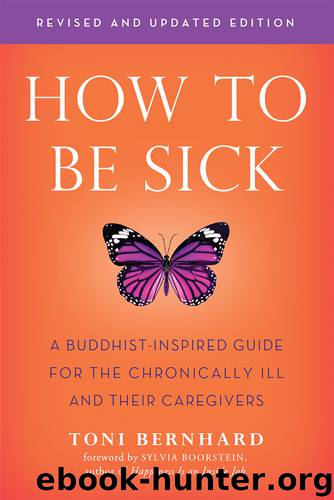How to Be Sick by Toni Bernhard

Author:Toni Bernhard [Bernhard, Toni]
Language: eng
Format: epub
ISBN: 9781614295037
Publisher: Wisdom Publications
Published: 0101-01-01T00:00:00+00:00
11
Tonglen: Spinning Straw into Gold
O that my monk’s robe were wide enough to gather up all the suffering people in this floating world.
— RYOKAN
TONGLEN IS a compassion practice that comes from the Tibetan Buddhist tradition. Nonetheless, the above Zen poem by Ryokan captures for me the essence of tonglen. Of course, they are both inspired by the example of the Buddha.
When I first got sick, it didn’t take long for me to accumulate a collection of healing CDs from a variety of spiritual traditions. They had one thing in common: I was instructed to breathe in peaceful and healing thoughts and images, and to breathe out my mental and physical suffering. In tonglen practice, however, the instruction is to do the opposite. We breathe in the suffering of the world and then, as we breathe out, we release that suffering and offer others whatever measure of kindness, compassion, and peace of mind we have to give. It’s a counterintuitive practice, which is why the Buddhist nun and teacher Pema Chödrön says that tonglen reverses ego’s logic.
Tonglen practice was brought to Tibet from India in the eleventh century as part of a group of teachings known as the “seven points of mind training,” a collection of fifty-nine “slogans” for practicing the path of compassion. The practice of tonglen is described in this slogan: train in taking and sending alternately; put them on the breath.
Those two phrases don’t give us a lot of guidance, but for hundreds of years this slogan, along with the other fifty-eight, has been a favorite subject for commentary by Tibetan masters who flesh out the meaning of each slogan. Tonglen, literally translated as “giving and receiving,” has become “Breathe in the suffering of others; breathe out thoughts of kindness, compassion, and peace.” We are, in effect, breathing out the sublime states of mind introduced in earlier chapters.
I had learned tonglen practice before getting sick, but I didn’t use it very often. Now it’s one of my principal compassion practices. My bond with tonglen occurred on the first day I returned to work, six months after getting sick in Paris.
Like everyone else around me, I couldn’t believe I wasn’t well enough to continue with my profession, at least on a part-time basis. So a half-hour before my scheduled class, Tony dropped me off at the front door of the law school. It was the second week of January 2002. I took the elevator up one floor to my office. I was to teach Marital Property to second- and third-year students. As soon as I sat down in my office chair, I knew I was too sick to be there. I began to panic, so I lay down on a couch in the office. Unexpectedly, my thoughts turned to the millions of people who must go to work every day even though they’re chronically ill. I realized that many of these people were in a worse position than I was — if they didn’t go to work, they wouldn’t be able to pay the rent or buy food for their families.
Download
This site does not store any files on its server. We only index and link to content provided by other sites. Please contact the content providers to delete copyright contents if any and email us, we'll remove relevant links or contents immediately.
| Acupuncture & Acupressure | Aromatherapy |
| Ayurveda | Chelation |
| Chinese Medicine | Energy Healing |
| Healing | Herbal Remedies |
| Holistic | Homeopathy |
| Hypnotherapy | Massage |
| Meditation | Naturopathy |
| Reference |
Inner Engineering: A Yogi's Guide to Joy by Sadhguru(5928)
The Power of Now: A Guide to Spiritual Enlightenment by Eckhart Tolle(4789)
Fear by Osho(4108)
The Art of Happiness by The Dalai Lama(3405)
The Ultimate Bodybuilding Cookbook by Kendall Lou Schmidt(3347)
Yoga Therapy by Mark Stephens(3242)
Ikigai by Héctor García & Francesc Miralles(3189)
The Little Book of Hygge by Meik Wiking(3098)
Why Buddhism is True by Robert Wright(2847)
The Healing Self by Deepak Chopra(2814)
Being Aware of Being Aware by Rupert Spira(2721)
Shift into Freedom by Loch Kelly(2706)
Wild Words from Wild Women by Stephens Autumn(2608)
Work Clean by Dan Charnas(2572)
Happiness by Matthieu Ricard(2538)
The Hatha Yoga Pradipika (Translated) by Svatmarama(2516)
Yoga Body & Mind Handbook by Jasmine Tarkeshi(2470)
More Language of Letting Go: 366 New Daily Meditations by Melody Beattie(2463)
Why I Am Not a Feminist by Jessa Crispin(2253)
